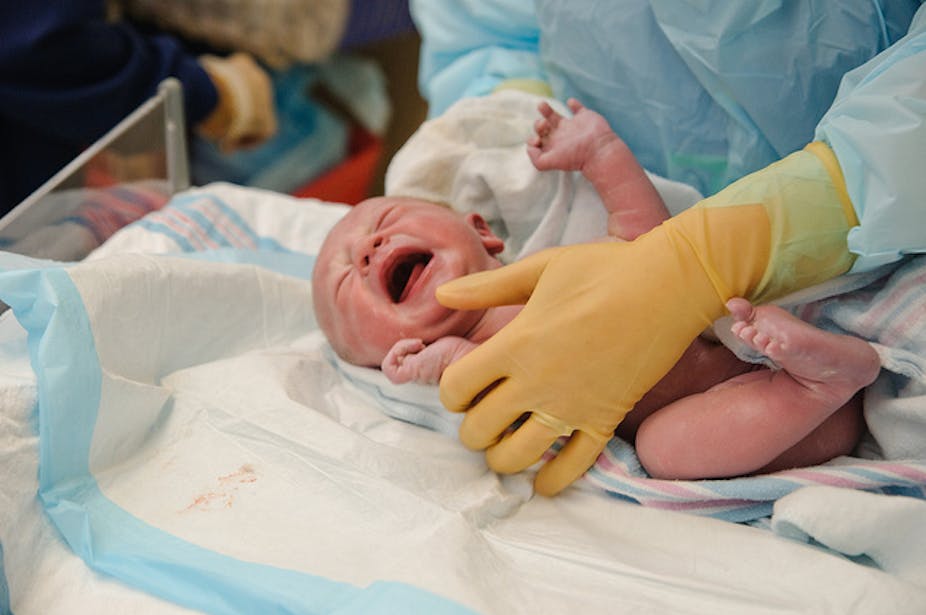For centuries, children have been subjected to cultural and medicalised practices that were ultimately proven harmful and a violation of basic bodily integrity. Such practices have included foot binding, forehead flattening, scarification and genital cutting.
In English-speaking countries, the practice of cutting the genitals of male children was gradually medicalised over a period of 150 years with the benign-sounding label “circumcision.”
Today, there is increasing awareness that infant male circumcision – once deemed a “parental choice” – is really an unnecessary, irreversible and harmful bodily modification.
With the recently discovered functions of the foreskin and a growth in awareness, we’re fortunately beginning to see the rights and experience of the child become the paramount consideration in discussions about circumcision.
The foreskin
The human foreskin is a contiguous part of the skin system of the clitoris or penis.
In infant males, the foreskin is attached to the head of the penis (glans). The outer foreskin protects the more sensitive inner foreskin and the glans from abrasion and injury.
The moveable skin facilitates sexual pleasure. In fact, the foreskin is typically the most sensitive area of the penis.
When circumcised males lose sensitivity and skin mobility, it’s likely to significantly alter their sexual experience.
One recent Danish cross-sectional study concluded that male circumcision was associated with sexual difficulties for men and their female partners.
Bioethics of a non-treatment surgery on minors
Surgery without consent is ethical only in cases for:
1) incapacitated patients, in order to save their life
2) minors, with proxy consent from a parent or guardian, but only for surgery that addresses an underlying condition.
Excision of an infant’s foreskin for dubious medical or cultural purposes is an anomaly. Because it removes healthy, typically-developed tissue, the procedure fails to meet either of the above conditions.
Circumcision of minors also stands in contradiction to other medical ethics principles, including:
Avoiding causing needless harm
Promoting the patient’s medical well-being
Providing information on a procedure that a reasonable person would deem significant.
Complications
Circumcision can cause skin bridges, haemorrhaging, infection, as well as major penile damage.
Dozens of case studies describe severe complications, including penile amputations and death; several infant deaths have been reported in the past few years.
A Canadian Coroner’s report, issued in 2007 following the death of a baby in Ontario, recommended the Canadian Paediatric Society conduct a surveillance study on complications.
The most detailed assessment of circumcision complications cites meatitis (affecting 8% to 31% of those circumcised), infection (affecting between 0.4% and 10%, age varying) and many other severe complications.
A more recent British literature survey estimates complications, including infection and hemorrhage, at rates as high as 10%.
Paediatric urologist David M. Gibbons, commented on MensHealth.com: “in a two year period, I was referred [more than] 275 newborns and toddlers with complications of neonatal circumcision … 45% required corrective surgery (minor as well as major, especially for amputative injury) …”
Another urologist reported repairing over 1,600 botched circumcisions over a three-year period.
Official rates of complications are likely to be under reported. But regardless of the actual complication rate, it is unethical to subject a child to these risks.
Insignificant benefits
While some use medical benefits to justify male circumcision, those gains rarely materialise in the real world, and the damage outweighs any gain.
For example, circumcision is purported to reduce female-to-male HIV transmission by 50% to 60%. But studies of the general population have failed to find any decrease in HIV infection rates among circumcised men compared with uncircumcised men.
HIV rates are three to four times higher in American men (mostly circumcised) than in Europe (rarely circumcised). But factors far more significant than circumcision status determine HIV transmission.
While proponents claim circumcision reduces other sexually-transmitted infections (STIs), a 2008 New Zealand birth cohort study did not find any such evidence.
Misleading portrayal
Despite potentially severe complications, hospital websites generally portray circumcision as values-neutral and safe.
Because most hospitals don’t give parents adequate information on the risks of circumcision to allow for true informed consent, few parents understand the effects their choice will have on their child and the adult he will become.
Parental regret and survivor perspectives
In blogs, vlogs and other online forums, many parents have shared concerns about their child’s circumcision.
Experiences range from “If I knew what I know now, I wouldn’t have done it,” to “I will die hearing my baby’s screams”.
Many men have also expressed dissatisfaction with their circumcision, including a sense of “being violated,” “being sexually maimed,” and having feelings of anger toward parents or the medico who performed their circumcision.
On thousands of websites, Facebook groups and blogs, circumcised men go to share their experiences and support one another.
Society’s role
A cultural framework that considers circumcision ethically neutral and the foreskin “a useless flap of skin” omits important considerations.
Before debating supposed benefits, we need to ask why would we ever even consider cutting our children’s genitals.
The medical benefits of male circumcision are insignificant: no evidence to date justifies irreversible surgery on children unable to give consent.
Society has recognised the inherent right of minor females to be free from unnecessary genital cutting.
In the twenty-first century it is time to recognise the same rights of male children.
Is infant male circumcision unethical and harmful? Have your say below.
Read Brian Morris’ article Male infant circumcision: ‘safe, convenient, cheap and fast’
For more of Ryan McAllister’s research in infant male circumcision, watch his recent university lecture: Circumcision, an Elephant in the Hospital.
Watch John W. Travis’ video on infant wellness and circumcision here.

